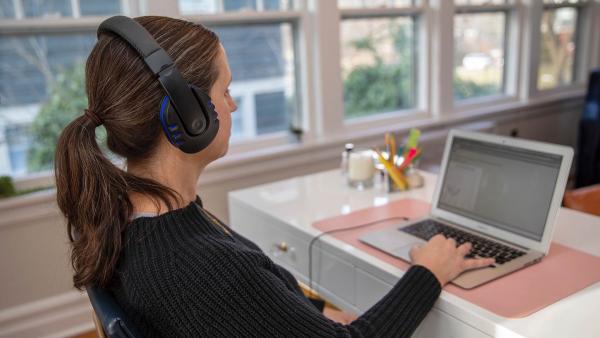Personal Audio Reimagined
UMD Research Powers Company’s Systems That Compensate for Hearing Differences
University of Maryland research was front and center at one of the nation’s biggest trade shows earlier this month, when new technologies that allow TVs, headphones and other audio devices to be customized to users’ unique hearing needs and abilities were presented at the 2022 Consumer Electronic Show in Las Vegas.
The technologies—which go beyond entertainment applications by helping pilots better determine where sounds are coming from and users with hearing loss understand speech sounds—are part of the RealSpace 3D digital sound simulation suite developed by VisiSonics, a spatial audio technology company located in the university’s Discovery District. in 2009, VisiSonics was spun out of the Perceptual Interfaces and Reality Laboratory run by Professor Ramani Duraiswami, a professor in the Department of Computer Science and UMD's Institute for Advanced Computer Studies.
One of the technologies the VisiSonics team showed CES attendees allows for audio personalization based on “head-related transfer functions,”—essentially, how the shape of our heads allow us to determine where a sound is coming from.
“All 7 billion of us have a different-shaped head, different-shaped body and especially different-shaped ears,” said Duraiswami. “These weird shapes that we have help the sound to scatter off them before the sound enters the ear canal, and when it does enter the ear canal, then your brain is able to find out where the sound is coming from by the way extra cues that have been added to the sound by that scattering process of your body.”
 With the help of physics-based algorithms, VisiSonics has found a way to take those measurements from a handful of smartphone photos of an audio device user’s head and provide customized directional sound via a variety of speaker setups, from headsets to car audio systems. This technology has attracted customers that include Tesla, SpaceX, Oculus, Ford, BMW, and Andrea Systems, a communications systems and equipment supplier to the U.S. military.
With the help of physics-based algorithms, VisiSonics has found a way to take those measurements from a handful of smartphone photos of an audio device user’s head and provide customized directional sound via a variety of speaker setups, from headsets to car audio systems. This technology has attracted customers that include Tesla, SpaceX, Oculus, Ford, BMW, and Andrea Systems, a communications systems and equipment supplier to the U.S. military.
The company also demonstrated VisiSonics’ newest technology—one that takes audio personalization to another dimension.
“It’s one thing to measure what’s going into the ears, it’s another to understand what’s going on within the ear and the brain,” said hearing and speech sciences Professor Matthew Goupell, who initially received $100,000 in Phase I funding from VisiSonics ($10,000) and the Maryland Industrial Partnerships program ($90,000) to work with the company to develop a remote hearing test that would allow audio experiences to be optimized according to a user’s hearing ability.
The test, known as an audiogram, measures hearing at various frequencies and allows hearing scientists like Goupell to not only identify whether a person might have hearing loss, but also why they might struggle to understand certain speech sounds and not others.
“When you are gaming or watching movies, there are times when it's important to know where a sound comes from, and there are other times when it’s important to understand dialogue really well,” said Goupell. “That’s the whole point of audiology: Can we help you hear the words?”
In his Auditory Perception and Modeling Lab, Goupell and audiology graduate student Sarah Weinstein have been conducting the experiments that enable VisiSonics to deliver a highly accurate, remote audiogram assessment through an application that can be used on mobiles devices or computers. In March, they will receive another $100,000 in Phase II funding from VisiSonics and the Maryland Technology Enterprise Institute (MTech) to make the audio in podcasts, movies, games and other entertainment even more understandable for listeners..
“Particularly for people with hearing loss, this has a lot of potential,” said Goupell.
This article by Rachael Grahame originally appeared in Maryland Today.
Photo illustration by Shutterstock; Photo of woman testing her hearing by Mason Levinson
Published on Thu, Jan 27, 2022 - 11:44AM



